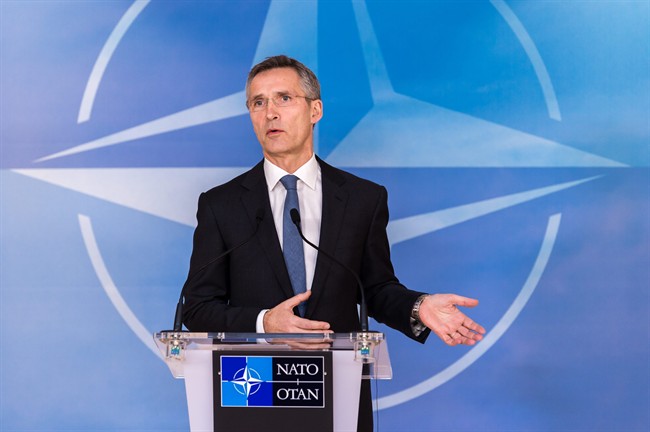BRUSSELS – NATO said Friday it will deploy small units in six eastern European nations to help co-ordinate a spearhead force set up in response to Russia’s actions in Ukraine.

NATO Secretary General Jens Stoltenberg said the units in Estonia, Latvia, Lithuania, Poland, Bulgaria and Romania will be the first of their kind there.
Defence ministers from the 28-nation military alliance will discuss the full force, which can react quickly to any hotspots in Europe, when they meet on Feb. 5.
Stoltenberg said countries responsible for providing the several thousand troops should be known next week.
READ MORE: Canada providing $200M loan to Ukraine

Get daily National news
The forward units will comprise a few dozen troops only. They will plan and organize military exercises, and provide command and control for any reinforcements the force might require.
“They’re going to plan, they’re going to organize exercises, to provide … some key command elements for reinforcements,” Stoltenberg said.
NATO forces conducted some 200 military exercises in 2014 and Stoltenberg, speaking at his regular monthly press conference, vowed that this would continue as the Alliance adapts to the increased presence of Russian war planes in European skies. NATO intercepted more than 400 Russian aircraft last year.
On Thursday, British fighter jets scrambled to intercept Russian bombers which did not make contact with British air traffic control.
READ MORE: Rockets kill 30 in Mariupol, Ukraine president calls it a terrorist act
Stoltenberg also warned that Russia has continued to build up its military, as European NATO allies cut budgets again last year. The alliance has been on a drive to spend more efficiently and to pool and share resources but even this, he said, would not be sustainable.
“It is not possible to get more out of less indefinitely. That is the reason why we have to stop the cuts and gradually start to increase defence spending as our economies grow,” he said.
“Despite the economic crisis, despite the financial problems they are facing, Russia now is still giving priority to defence spending.”
- Boy kidnapped from California park in 1951 found more than 70 years later
- Trump was target of ‘assassination attempt,’ Florida suspect said in note: feds
- Airline bans couple after reclined seat spat turns into harassment, slurs
- After false claims about Haitian immigrants, what’s happening in Springfield, Ohio?







Comments